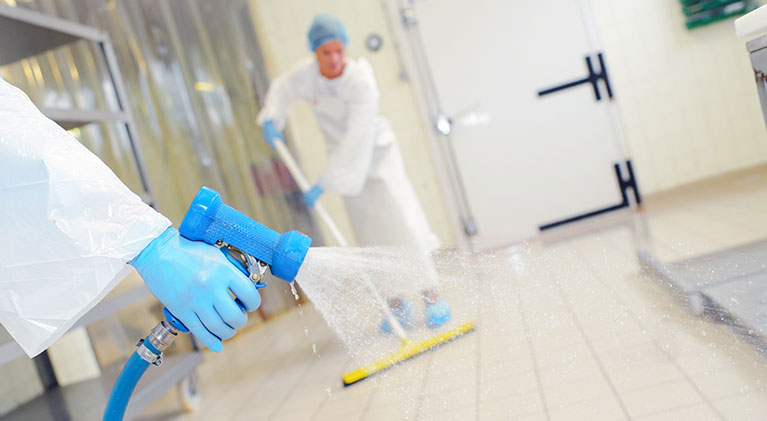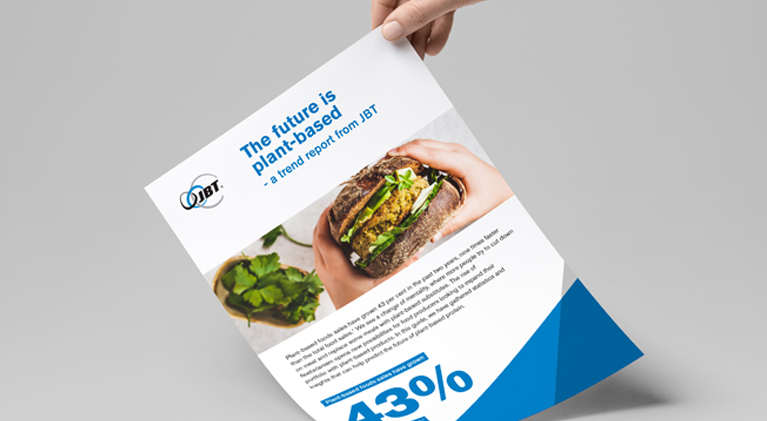Recalls are every food producer’s nightmare. Apart from potentially harming customers’ health and the financial loss from unsold products and long downtime in the production line, food safety issues might also cause severe damage to your brand’s reputation. In 2016 alone, there were 764 food industry recalls1, each costing an average of $30-100 million2 in product waste and sales losses. New and small businesses tend to be more vulnerable to scandals – one false step and your company may be out of business! That’s why hygiene should always be the top priority at the production facility. Since JBT started, we have acquired a deep knowledge of food safety. All of our solutions are hygienic-by-design and easy to clean and maintain. As your committed partner, we are eager to help you improve the hygiene in your food production line.
Common food safety risks
There is always a risk of contamination when handling food in the production line. Bacteria, viruses, mold, and fungus are the most common issues that can cause harm to consumer or animal health. In theory, food poisoning is 100% preventable with thorough routines for handling, preparing, storing, and cleaning. In reality, too many persons and external factors influence the process, no matter how many precautions you take.
Listeria is one of the most feared food-related bacteria and spread with anything from meat, fish and poultry to fruit and vegetables. The potentially deadly bacteria can cause severe health damage, with permanently closed factories as a result. Apart from many other bacteria, listeria can thrive in a refrigerated and even frozen environment. It is, however, killed when cooked thoroughly.
How to prevent the spread of foodborne illness

It is of utmost importance to secure that the equipment you use for food processing is sanitary and works properly. Food safety starts at the drawing board, where we design to minimize all unnecessary surfaces and use as little material as possible to avoid dirt traps. We call it Hygiene by Design and it is especially important in food zone 1 where the equipment has direct physical contact with the products. But also in surrounding food zones where biofilm can increase the risk for bacterial growth. One example of Hygiene by Design is the Frigoscandia self-stacking belt that builds up a self-contained product zone reducing the structural parts, which means fewer surfaces to be cleaned, less wasted water and less detergents consumption. With the self-stacking belt design there is no stationary rail support structure that can be found in the other types of spiral freezers, which results in collected debris and is almost impossible to clean. For the toughest food productions JBT offers a unique design and innovation in the Fully Welded Enclosures (FWE), combining disinfection with hot steam sanitation. This hygienic design removes the risk of biofilm and microbiological growth in a freezer unit.
Monitoring systems
Regular inspections and preventive maintenance are important factors for safe operations. By continuously monitoring the machine’s performance, you can make sure that every application is treated correctly. Just a slight deviation in the temperature can significantly impact the product’s safety and shelf-life. JBT offers a wide range of connected solutions that automatically monitor the performance and alarms when in need of action or troubleshooting. With the increasing need to maintain high food standards, integration of our new cloud-based performance optimization platform iOPS also can improve both food safety and energy savings. Concentrations of cleaning chemicals, as well as cleaning water volume and temperature, are examples of things we can measure and document. This provides you with the reassurance that cleaning procedures are being followed and potential bacterial growth issues prevented. Moreover, iOPS technology greatly helps reduce waste, cost, and risks at all stages of the production process.
Furthermore, X-ray food inspection is a preventive technology that can help you detect contamination and foreign material in packaging and processed food to avoid recalls and hazardous bacterial outbreaks. JBT has developed a series of X-ray detection systems that are easily integrated into your production line.
Clean machines
We know that the process of thoroughly cleaning your equipment takes time and can be both difficult and costly. JBT can help you get a good night’s sleep by offering solutions specifically designed for fast, thorough, and economical cleaning of your food processing equipment. Moreover, JBT has developed a series of detergents that meet the rigorous requirements of legislative and customers. Naturally, all of our products are designed to work within food production facilities. They can handle both extreme temperatures and prevent bacterial growth.
Grow your business with higher food safety
Whether you are looking to improve your production line’s safety or are interested in trying our detergents, we are eager to help you. Did you know that we provide training in general food safety, HACCP, use of cleaning systems, and the design of equipment for sanitation? Fill out the form, and we will contact you shortly.

The Future is Plant-based
References
- Maberry, Tiffany. “A Look Back at 2016 Food Recalls.” Food Safety Magazine. N.p., 7 Feb. 2017. Web. 12 July 2017.
- Kowitt, Beth. “Why Our Food Keeps Making Us Sick.” Fortune. N.p., 6 May 2016. Web. 07 July 2017
Need help developing your product?
With the world’s largest database with application tests and more than 30 years of experience in processing plant-based protein, we know how to make the most out of your product in terms of taste, yield and consistency. The food experts at our Food Technology Centers help you develop your ideas or enhance existing ones. The tests can be conducted on our testing site in person or via live video link or as on-site demonstrations with our mobile lab equipment in your facility.

